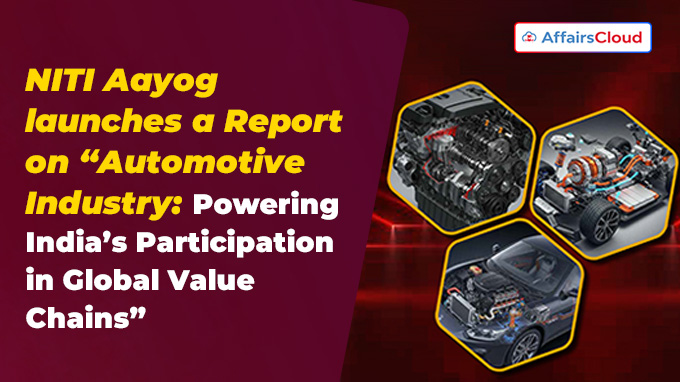 In April 2025, the National Institution for Transforming India (NITI) Aayog released a comprehensive report titled “Automotive Industry: Powering India’s Participation in Global Value Chains”. This report is the second in the series of Global Value Chains (GVCs). It was launched by Suman Bery, Vice Chairman, NITI Aayog.
In April 2025, the National Institution for Transforming India (NITI) Aayog released a comprehensive report titled “Automotive Industry: Powering India’s Participation in Global Value Chains”. This report is the second in the series of Global Value Chains (GVCs). It was launched by Suman Bery, Vice Chairman, NITI Aayog.
- The report explores the transformative potential of India’s automotive component industry, outlining a strategic roadmap to elevate India’s presence in the global automotive ecosystem.
- It highlights current trends, challenges, and strategic interventions necessary to strengthen India’s presence in GVCs.
Note: GVC refers to a phenomenon where production is broken into activities and tasks carried out in different countries.
Key People:
The report was launched in the presence of BVR Subrahmanyam, Chief Executive Officer (CEO), NITI Aayog; Dr Vijay Kumar Saraswat, Member, NITI Aayog and Dr. Arvind Virmani, Member, NITI Aayog.
India’s Automotive Industry:
i.India has emerged as the fourth-largest automobile producer globally, following China, the United States of America (USA), and Japan, with an annual production of nearly 6 million automobile units.
ii.Supported by initiatives like ‘Make In India’ (MII) and its cost-competitive workforce, India is positioning itself as a hub for automotive manufacturing and exports.
iii.India’s automotive industry contributes 7.1% to its Gross Domestic Product (GDP) and 49% to manufacturing GDP
iv.The Indian Auto industry produced over 28 million vehicles, including Passenger Vehicles, Commercial Vehicles, three-wheelers, two-wheelers, and Quadricycles from April 2023 to March 2024.
Global Automotive Landscape:
i.In 2023, global automobile production of cars and commercial vehicles reached approximately 94 million units.
ii.The global automotive components market was valued at around USD 2 trillion in 2022, with the export share reaching approximately 30%, equivalent to USD 700 billion.
- Approximately 70% of automotive components are produced domestically for consumption within their respective markets.
iii. India’s share in the global automotive component trade is around 3% (~USD 20 billion).
- India’s trade ratio in auto components is near neutral (~0.99), with exports and imports nearly balancing each other.
Emerging Sectoral Trends:
i.The rise of Electric Vehicles (EVs) is one of the most significant trends reshaping the global automobile manufacturing landscape.
ii.The rise of EVs has also led to the creation of new manufacturing hubs, particularly for battery production.
- Gigafactories for battery manufacturing are being established in regions such as China, Europe, and the USA.
iii.Industry 4.0 technologies: Artificial Intelligence (AI), the Internet of Things (IoT), and robotics are modernising production and enabling smart factories and connected vehicles.
- It enhances production processes, improves productivity, reduces costs, and enables greater flexibility.
Challenges in India’s Automotive Sector:
i.India’s presence in the global automotive component market is relatively modest, contributing 2-4% across most segments.
ii.Challenges that restrict the global competitiveness of India’s automotive sector include high operational costs, infrastructure deficits, moderate GVC integration, and low Research and Development (R&D) investment.
iii.The report outlines several strategic fiscal and non-fiscal interventions aimed at enhancing India’s global competitiveness in the automotive sector.
Vision for 2030: Transforming India’s Automotive Sector:
i.This report predicts a bold future where India’s automotive component production reaches USD 145 billion by 2030, with automotive component exports tripling to USD 60 billion (from USD 20 billion).
ii.This growth would lead to a trade surplus of approximately USD 25 billion and a significant increase in India’s share of the global automotive value chain from 3% to 8%.
Recent related News:
In February 2025, the National Institution for Transforming India (NITI Aayog) released a report titled “Expanding Quality Higher Education through States and State Public Universities”, a first-of-its-kind policy document in the higher education sector focused specifically on states and State Public Universities (SPUs).
About the National Institution for Transforming India (NITI) Aayog:
Chief Executive Officer (CEO)- B.V.R. Subrahmanyam
Headquarters– New Delhi, Delhi
Established– 2015




